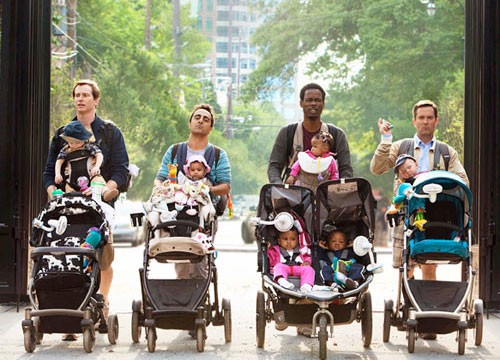Where The US Stands On Paid Family Leave At The End of 2015
Where The U.S. Stands On Paid Family Leave At The End of 2015

Where are we vis a vis paid family leave versus where we were a year ago? A lot of us have agitated, protested, written about the subject at great length; others of us, such as new dad Mark Zuckerberg, who announced he would take a full two months to care for his baby daughter, have put themselves out there as good examples in the hopes of changing the culture.
So, has anything shifted?
Sort of!, reports Elissa Strauss at Elle.com. The situation on the ground remains far from ideal.
Currently, only 13% of American families receive paid family leave from their employers, and a recent investigation found that one in four mothers returns to work two weeks after giving birth because they can’t afford to live without the income and/or fear losing their jobs.
More and more of America’s elite employers are competing to offer the best benefits packages, though, and that includes paid leave. Just this year, a bunch of tech giants updated their terms of service (see what I did there?) to make life better for parents, including Netflix, Amazon, Adobe, Spotify, and Microsoft.
Three states joined the parade: California, Rhode Island, and New Jersey. More are considering it.
It’s easiest to implement paid leave in states that already have something called a Temporary Disability Insurance program. All three states that have paid family leave use this program to administer it. New York and Hawaii are the only other two states with such programs, meaning that they already have the infrastructure in place to enact statewide paid family leave.
Activists in Washington, D.C. are fighting for the creation a city-wide paid family leave policy, and they’ve got 80% of the city on their side. In July, the legislature in Connecticut approved a budget that allocated $140,000 to be used on research into how exactly the state could implement their own paid family leave. Hawaiians are starting to take the creation of such a policy seriously, and in August they invited US Labor Secretary Tom Perez to talk paid leave with local politicians, advocates, and business people about how to make it happen. There’s also action brewing in a number of other states, including Arizona, Colorado, and Washington (where a law was passed in 2007, but has yet to be implemented do to funding issues).
On a national scale, there has been some progress, too. President Obama singled out the issue in his State of the Union address. Candidates Hillary Clinton, Bernie Sanders, and Martin O’Malley all support the creation of a coherent, country-wide policy, and one of their Republican rivals, Marco Rubio, has weighed in with a more conservative-friendly version too.
All of that is heartening, right? But did it move the dial in terms of hearts and minds? Well, back in January, here’s how the issue polled:
Large majorities of voters of all persuasions said they are in favor of paid sick days, equal pay for equal work and affordable child and elder care, and 73 percent say the government has a responsibility to ensure employers treat employees fairly by providing them with such policies. About 70 percent said that workplace laws and policies are out of synch with the changing realities of modern families, and with the changing roles of men and women at work and at home.
And 81 percent — 94 percent Democrats, 80 percent of Independents and 65 percent of Republicans — agree that workplace rules to ensure equal pay, paid time off to care for family members and affordable child care “is good for our nation.”
The catch is that the poll was conducted by “the Democratic polling firm Lake Research Partners, [and] surveyed a cross section of 800 likely 2016 voters.” So, okay, I wouldn’t take those numbers to Vegas.
US News has collated more polls though and found the same results:
Polls consistently show that a large majority of voters — including a majority of Republicans — favor paid leave laws. According to a recent poll by the Roosevelt Institute, in fact, 83 percent of respondents, and 67 percent of Republicans, said that paid family and sick leave would be effective in creating a better economy. The same poll found that paid leave policy is one of the biggest drivers of potential votes — more so than other popular campaign trail items such as college affordability, the minimum wage and taxing the rich.
FWIW, the Roosevelt Institute is also progressive. But the issue is, apparently, resonating across the aisle.
“The reality of family work-life for most Americans is quite difficult and although Republicans are very reluctant to introduce new government programs, which I pretty much agree with, I don’t see how this one is avoidable,” says Kay Hymowitz, a senior fellow at the conservative leaning Manhattan Institute. “Republicans are going to have to address this is for strategic reasons; if we hear about some cities like Washington, D.C. offering four months of paid leave, the public is going to say ‘yeah, give me some of that.’”
We sure are.
This is all more heartening, honestly, than I would expect. I don’t know what kind of supermajorities an issue needs to command in order to make something happen these days, but whatever it is, it seems like we may be approaching it. And it’s about damn time.
What kinds of progress have you seen at the local or job level, if any? Do you have hope for 2016?
Support The Billfold
The Billfold continues to exist thanks to support from our readers. Help us continue to do our work by making a monthly pledge on Patreon or a one-time-only contribution through PayPal.
Comments